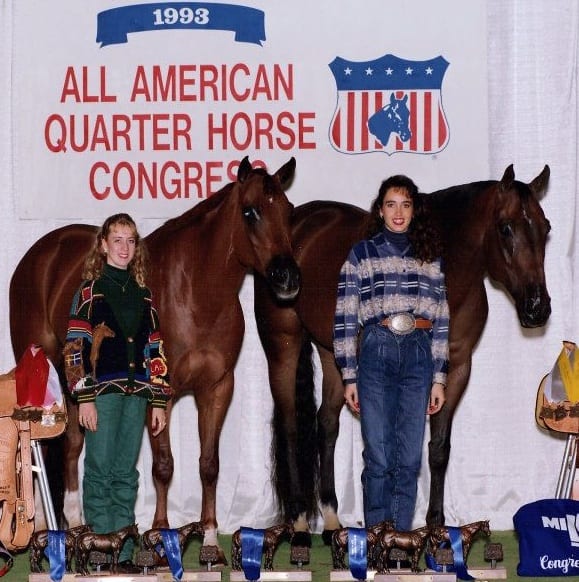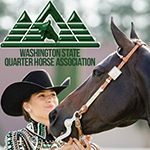“Welcome to Boot Camp”, Nancy Perlich (Kenway) said to her friend Megan Merrill (Miller) as she arrived at Solano Ranch in 1994. Nancy had been the first of my girls to arrive. With her horse living 2000 miles away from Nancy’s Lethbridge, Alberta home, I was anxious for her to get back in the saddle, on her show horse and in shape for the coming events.
And ride she did, everything I had in the barn from sunup until sundown. These were not the fun-filled days spent under the Texas sun sipping iced tea with friends by the pool that Nancy had envisioned for her summer vaca.
Nancy’s choice of words was not lost on me nor was the sarcasm. But she was absolutely right; Megan, Nancy and the others had indeed arrived at boot camp. This was long before every local health club offered “boot camps”; before images of sweat glistened hard bodies bombarded billboards, buses and magazines; before your inbox was filled with invitations to boot camps for your latest tech purchase and long before patterns were available on the internet a month before the show.
But the title “World Champion” has not changed. The talent it takes to win a World Champion title has not changed and the work that goes into making a World Champion has not changed. Thus the need for boot camps…
Boot camps are a takeoff of military recruit training designed to prepare soldiers for anything they might encounter in the battlefield. For showmen, the battlefield is the show pen; the boots are made for riding, not walking; horses, saddles and bridles replace tanks, backpacks and weapons and the battalion is made up of their stable mates, riding buddies and competitors. The common thread between boot camps of all sorts is the key ingredients that make them an effective means of training:
- Discipline
- Core training
- Strict code of conduct
- Teamwork
Don’t think that you have to have a trainer to go to boot camp. Although to be effective you do need to build a team, you are in complete control of who you choose to be on your team. You do need to ride with others. Your riding teammates will be the ones to hold you accountable; they will drive you to complete the exercises, to ride the entire 30 minutes without your stirrups, to ride at 6 am and again at 7 pm.
Riding buddies, your coach or your team leader will provide inspiration to go on – to push through the tough rides and to exceed the expectations you have set for yourself. Your ability to build a good team, while last on the list above, has a huge impact on your ability to achieve your goals. Choose your teammates carefully – they will determine how much you get out of your boot camp experience.
Discipline
The single most important characteristic needed to achieve your goals is discipline – and it is the essence of boot camps. Initially discipline is usually enforced by a trainer, coach, aka drill sergeant, parent or riding buddy. The result of forced discipline is self discipline, a quite intentional consequence and a necessary ingredient for success in any endeavor.
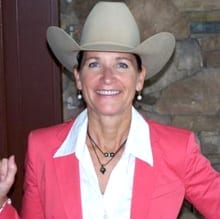 Boot camps drill riders in a systematic method to obtain order, self-control and improve competency. By creating a routine and sticking to it, good habits quickly replace bad habits and riders accelerate their learning. The end goal: be prepared to perform well under any circumstances. Reactions should be natural and executed correctly.
Boot camps drill riders in a systematic method to obtain order, self-control and improve competency. By creating a routine and sticking to it, good habits quickly replace bad habits and riders accelerate their learning. The end goal: be prepared to perform well under any circumstances. Reactions should be natural and executed correctly.
*Create a routine (start each ride with ten minutes in two-point or without stirrups)
*Make a to-do list (improve stop-360-extended trot transitions, clean tack after each use)
*Delay gratification (don’t take short cuts, leave your phone in the barn)
*Set clearly defined goals (ride 30 minutes without stirrups by end of summer)
*Be persistent and stick to your routine (start EVERY single ride drilling perfect form while your horse warms up)
Disciplined riders succeed, plain and simple. Establishing a routine is important. The routine gets you in the zone enabling you to develop the will power to stay until the end. There will be a time when you must challenge your routine but not until some core habits have become second nature. Developing self-discipline builds confidence, clarifies what is important in your life, improves your ability to control impulses and ignore negative emotions and increases long-term satisfaction. (Nancy Perlich Kenway pictured above with Ashlee Donaldson)
Core Training
At the heart of boot camp is core training. The goal of core training, training the most basic elements of your sport, is to establish a reliable foundation upon which all other skills are based. Think of your skills like those of your horse. You cannot teach a horse to change leads before the horse understands the correct cue to take each lead individually and separately.
You, like your horse, must first develop basic skills. Technique is everything in riding. Advanced riders must practice beginner moves to hone and maintain their skills to be competitive. Prioritize core skills as they are most important to developing your talent. This includes basic exercises that concentrate on your form, like balance exercises, riding without your stirrups or working on transitions, dissecting spins at a snail’s pace or stopping and setting up 10,000 times. No element or detail is too small to avoid concentrated effort on your part.
- Determine one simple move to concentrate on.
- Repeat and perfect this simple move before moving on.
- Pay attention to errors and fix them.
Developing precise fundamental skills is of huge importance, they are a key investment in your talent. An established routine sets the stage for proper the progression of skills. Pay particular attention to your form in the beginning. Your first reps are especially important as they establish your base.
The initial development of your foundation will form the path for subsequent skills. Muscle memory is a powerful tool and once learned your muscles will naturally take you to your roots. Use it to your advantage – start right: stay right. You are training yourself to react without thinking in the proper manner. You do not want to have to concentrate on keeping your heels down while waiting at the start cone at the World Championship Show.
Strict Code of Conduct
No good drill sergeant would allow his or her troops to whine when they get a saddle sore, put their horse away with sweat marks or go to the horse show without a support team. Without this code, no one would stay until the end, finish the last rep or sweat through challenges as they arise.
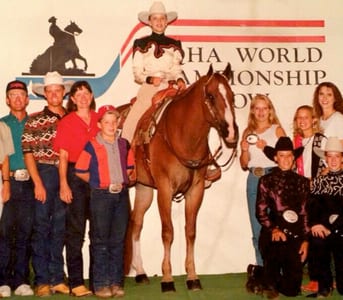 By creed, drill sergeants are sworn to assist troops, riders in our case, to become “highly motivated, well disciplined, physically and mentally fit” riders. They instill pride in all they train and insist that participants “meet and maintain standards of bearing and courtesy”.
By creed, drill sergeants are sworn to assist troops, riders in our case, to become “highly motivated, well disciplined, physically and mentally fit” riders. They instill pride in all they train and insist that participants “meet and maintain standards of bearing and courtesy”.
Adherence to the code in itself is part of the training and goes hand-in-hand with discipline. It is a principal element in achieving goals. (Megan Merrill Miller, pictured left)
- *Act like a professional.
- *Honor your word.
- *Work persistently to fix problems.
- *Follow directions.
- *Respect others and yourself.
By honoring this code you will attract success like a World Champion attracts friends for the win picture. You will not only meet your goals but exceed your goals. Pride develops with the knowledge that you have done your best to prepare and leads to a level of satisfaction ribbons cannot replace. Ribbons, trophies and accolades are the result of hard work. And while they are not only worthy but the stuff for which we all compete, they do not define us. Actions define merit, not awards won.
Teamwork
Whether or not you have a trainer, you need to have a team. Recently at a lesson with an amateur do-it-yourselfer, I was impressed to see that her stable mates pulled out lawn chairs and filed around the arena to watch their friend during her lesson. They were not there to pass judgment or to critique her ride. They were simply there to support her. Their presence made it clear; their encouragement evident, they were teammates, in every way. Her success was their success.
Everyone needs a team. Not only do trainers and coaches make great team leaders, they also rally the troops to support you when you are down. Teammates urge you to go on when times are tough. They also add a level of competition that prevents thoughts of quitting when muscles beg you to stop. Teammates cheer efforts, challenge your thresholds and celebrate your successes. They give you a leg up after being dumped at the base of a jump, keep you humble when a win makes your head swell and applaud your determination. Teammates give you reason to press on and share in the glory of a job well done.
- Have a mission for your team
- Set goals
- Everyone’s opinion counts
- Pick positively motivated people for your team
Everyone on the team has a job. It may be to bring the ice each morning, to hold the groom bucket or to listen to a teammate describe a poor lesson. Each member has to trust the others and be trustworthy. Consider the idea that being part of a team is being part of something that is larger than you alone. While every individual wants to win, the winner’s circle is a lonely place without friends to stand next to you in your win picture.
Make the most of your boot camp experience by following the guidelines above. Remember the purpose of boot camp is to create good riding habits through discipline, routine and by perfecting core competency. Your goal is to practice until you react instinctively in the correct manner for any and every situation – no matter the situation.
Have fun, work hard and consider how lucky we all are to learn life’s best lessons while sitting on the backs of our horses. They are the best teachers. And now it is time to drop those stirrups…..
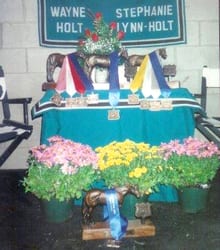 Team Solano Ranch
Team Solano Ranch
Each of the girls who came to “boot camp” that year in 1994 went on to become a World Champion. There were six of them that summer – each exceptional in their own right. They rode together, competed against one another, lived together and helped Ezequiel with chores after long days riding every burly nag on the place, with stirrups and without stirrups.
While there may have been an occasional grumble, they worked hard and played hard – and received honors for their efforts. I always felt an enormous responsibility for the precious lives that I was entrusted with. It is an incredible honor to help others achieve their goals. Stay tuned for boot camp exercises over the next four weeks.
About Stephanie Lynn:
Professional Horseman Stephanie Lynn coached her first AQHA World
Champion in 1988. She has since coached, trained and shown World,
Congress and Honor Roll horses across disciplines. She is a judge for
AQHA, NSBA and APHA and has judged World Championship shows for each
association. Most recently, Stephanie is the author of The Good Rider Series
and A Lifetime Affair: Lessons Learned Living My Passion. The Good
Rider Series is a library of resource material that is both practical
and applicable in the barn and show ring for riders. Stephanie can
always be reached through her website: http://www.stephanielynn.net to answer your questions, schedule a clinic or lesson.


